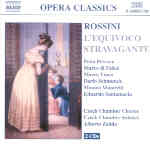The plot of this “Bizarre Deception” (a translation of the title) concerns the growing love between book-loving Ernestina and her tutor, Ermanno, which is being thwarted by Gamberotto, her nouveau-riche, pretentious father, who wants Ernestina to marry the young, dumb-but-rich Buralicchio. The house servants–the wily Frontino and Rosalia–are on the side of the two lovers, and they and Ermanno somehow convince Buralicchio that Ernestina is really a castrated boy in drag, running away from the army, thus making her/him ever-so unappealing. Mirth ensues. Ernestina is arrested by soldiers but is saved by Ermanno, and all ends happily. Because the libretto was considered obscene, the opera, first shown in Bologna in 1811, was banned by the police after three performances.
The 19-year-old Rossini already was an accomplished composer when he wrote this vastly entertaining, glib, and energetic work. The arias are flavorful if not totally memorable, and a quartet in the first and quintet in the second acts are top notch, as are both finales. The vocal writing is not nearly as ornate as in the composer’s later operas, but singers with polished techniques and style are still required for the work to succeed. Its humor is somewhat left-handed: not only do you have to find castration a hoot, but on a more subtle level the posturings of Gamberotto (seen as epitomizing the undeservingly moneyed) and Buralicchio (a true fool) are cruelly satiric.
Marco Di Felice and Marco Vinco respectively, are very good, and they sing well together. Their first-act duet, with trumpets and horns commenting on their pomposity, is a gem. Mezzo Petia Petrova, albeit without a particularly luscious timbre, is a lively Ernestina who seems to have a handle on her complicated situation, and she makes the best of both of her arias and shines in the work’s ensembles as well. Dario Schmunck’s tenor voice may lack the true Rossinian-lyric quality and charm we’d want in the role (and his pitch can be unreliable), but he is very much into the character of the ardent Ermanno. As the scheming Frontino, Eduardo Santamaria uses his tenor well; Monica Minarelli’s also-scheming Rosalia is unappealing. Albert Zedda’s conducting is well-nigh perfect, and his Czech forces play with polish, with good work from the chorus too.
The sound is a bit brash, and the live performance (from Wildbad, Germany, summer 2001) means lots of applause we don’t need. But in all, this little-known, early-but-fully-formed piece of Rossiniana is finely served and a necessity in every Rossini-lover’s collection. (Just for the record, an RAI tape from Naples in 1974–available on a Bongiovanni-related label–features the splendid Sesto Bruscantini and Rolando Panerai as the foolish pair, but the performance is somewhat cut and this new set outclasses that one in every other way.)
































